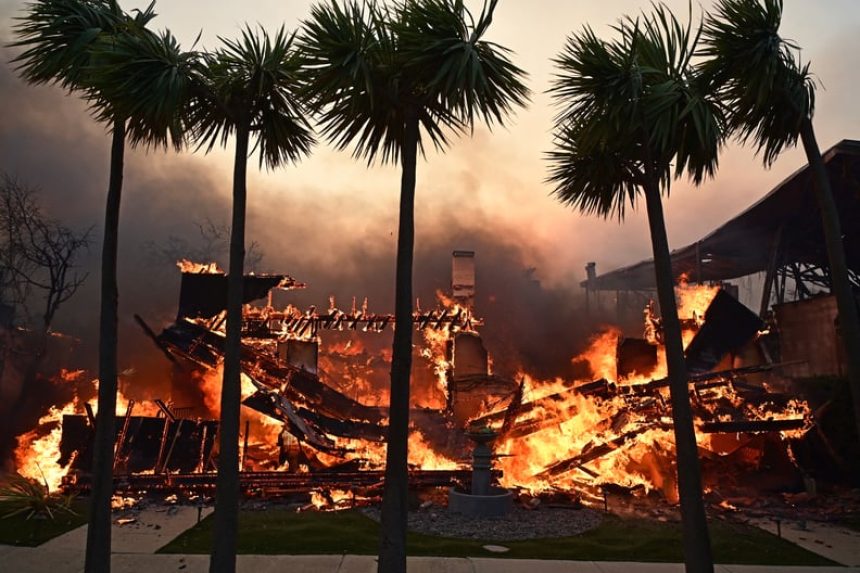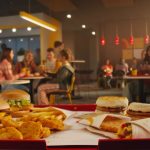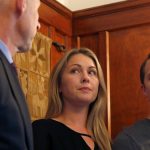:upscale()/2025/01/10/809/n/49351773/tmp_jnVqRQ_07db3553d2151ab9_LAFire_Main.jpg)
I felt it in the air — the harsh winds strong enough to blow down an 18-wheeler in Topanga. The smoke in my lungs was a warning; our world was on fire, and we were rushing out. On the news, I saw gridlocked cars abandoned as people took to running.
I’d felt this way before. I remember those final moments in March 2020, feeling in control right before it was too late. But whereas at the beginning of the pandemic, I was rushing home, now I had to seek refuge outside of my home. But where would I go? What would I bring with me?
On Wednesday, as I packed up essentials looking at an online “go-bag” guide, the news played in the background, glitching because of an unstable power connection. The fire had jumped to a place near me. Threatened by a potential fire, I took what I could. And I came to terms with all the things I could not take.
The places where I made my memories were ablaze.
I am not a materialistic person, but it is still impossible to imagine returning to rubble, ash, and memories of what once was. I brought what I love with me, what could not be replaced, what mattered most: my mom, my brother, and journals filled with memories. And those memories came flooding back to me because my memory is rooted in Los Angeles. My mother is a comedian, so I grew up in Hollywood comedy clubs. I found love and had my heart broken in Woodland Hills. My first taste of alcohol, Sex on the Beach, was at a restaurant in Malibu. I was raised on beaches and Hollywood.
I never had one home in LA; we moved from place to place. I don’t know what it’s like to have made all of your memories in one home. Instead, my memories zig-zag all throughout LA like the freeways, and my LA was burning. The places where I made my memories were ablaze.
:upscale()/2025/01/10/807/n/49351773/tmp_riaI2c_8961df6407382113_IMG_1171.jpeg)
:upscale()/2025/01/10/807/n/49351773/tmp_riaI2c_8961df6407382113_IMG_1171.jpeg)
I finished packing up my car, and my family and I began our journey south. We were uncertain where we should go, but knew that if we stayed, we may risk gridlock and running out of time. The power on the block by my home had gone out, and the streetlights did not work. We were crossing in the dark — in more ways than one. The goal was to just keep driving south, out of LA, far from my home. But we had to constantly check for freeway closures, since so many had been shut down. I tried to ignore that the world I knew was changing. It was a reality I didn’t want to accept.
My phone was blowing up. My best friend told me that her brother was on high alert; he was planning to go further south to San Diego. My agent fled to Palm Springs. We were uncomfortable and uncertain, but we headed toward Long Beach. When we got there, we went to the nearest hotel, and they were overbooked, like most of the hotels in LA. After the hotels in Long Beach turned us away, we sat in the car, not knowing where we could even go next.
I brought what I love with me, what could not be replaced, what mattered most: my mom, my brother, and journals filled with memories.
We decided to drive toward Fullerton, where we found a hotel we could stay at. I checked on all of my friends who were in other impacted areas. Some were stubborn and unafraid. Some overly anxious. My brother and I tried to immerse ourselves in a film, distracting ourselves from the disaster while everything we knew might be burning.
That night, I couldn’t sleep as I watched the fire.ca.gov alerts. The fires were still not contained. I thought of my friends who had evacuated and then had to evacuate again. I worried that even this far from the blazes, they would follow us. I barricaded myself with pillows, trying to create a sense of safety, of peace. I checked the website compulsively, refreshing and reloading. I had to pray myself to sleep, hoping the apocalyptic feeling would come to an end, as 2 a.m. slipped by. Eventually, the anxiety fatigued me, and I drifted off. When I woke on Thursday, I felt fear. My life was different, and I knew: we are going to have to rebuild. I checked on the fires, and I saw that they were — that they are — still burning.
As of Friday, my house is still standing, but so many others have lost their homes. The fire has cost more than just material things, including 20,000 acres of destroyed structures — so far, it has taken 10 lives and injured who knows how many. We have become part of the houses that were burned and the schools that we lost. Brave firefighters are still trying to contain the fires that erupted on Tuesday. The air quality remains awful. There could be more than $50 billion of damage. Thousands are displaced and don’t have homes to which they can return. When LA stops burning, we will have years of rebuilding ahead of us. But unfortunately, I can’t help but wonder — will this ever end?
Right now, I remain hopeful. The people of Los Angeles have come together to help; there are many places of shelter and resources for aid for those impacted. I can’t help but fear that there may be nothing but hope left in LA after all of this. Los Angeles is my home, and I will miss all the scorched parts of my past that I cannot visit.
Akaylah Ellison is a screenwriter whose storytelling blends the poetic and long-form narratives. Believing that empathy is a writer’s greatest asset, Akaylah creates characters who voice fringe realities and encourages people from different walks of life to connect with them emotionally. Akaylah wants to create content that reflects her real world, which is a blend of people from all backgrounds who coexist without explaining who they are and who never apologize for it.







